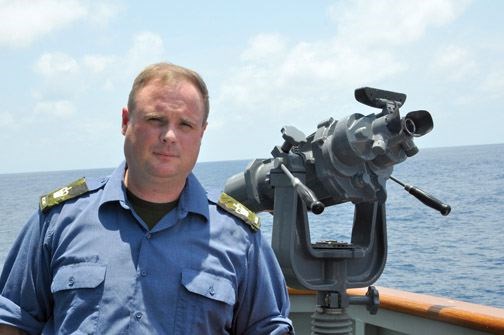Army Warrant Officer Ian Mothus from Prince George looks back on bullets flying over head as just another day on the combat outpost team after he spent three tours in Afghanistan as a medical technician from 2008 to 2011.
"You are trained so well before you go there everything just becomes a drill," said Mothus, who is now a physician's assistant in the Canadian Armed Forces on Her Majesty's Canadian Ship (HMCS) Winnipeg. "This tour is expected to hit most of the Pacific, so it'll be good. A chance to see the world where nobody's shooting at me."
During his years in Afghanistan, Mothus was a member of the Operational Mentor and Liaison Teams (OMLT).
"We always called it the omelette," said Mothus. "My first tour it was just six-man teams, by the second tour we were up to 10 and 12-man teams but we'd go and live in the combat outpost with Afghans. So it would be anywhere from six to 12 of us living with about 70 or 100 Afghans."
Every day the teams would fight and patrol alongside Afghans.
"We would teach them what soldiering is like for Canadians," said Mothus. "And I would teach a bit of first aid or a bit of medicine to their medics. So we were out there doing the work with them."
Live combat didn't seem to phase Mothus.
"So when you come under effective enemy fire you don't think about it, you just find the nearest cover and you start shooting back," said Mothus, whose worst injury was a twisted knee. "You are thinking about what you're doing, not about being scared and then I'm thinking about the guys next to me - how do I help them - how do I take care of them."
Mothus feels lucky that he was never wounded or worse.
"We were warned about an IED (improvised explosive device) that was planted on one of the routes that we'd patrol," said Mothus, who annually visits family in Prince George. "So we got warned and we found it before it happened. And it was about 200 kilograms of ammonium nitrate and fuel oil - it's what they use to blast mines and the Afghans used to use it all the time."
When the soldiers detonated the IED it left a crater about eight feet wide, five feet deep and 10 feet long in the road where Mothus and his team had patrolled the day before.
"Good experiences," said Mothus, who attended D.P. Todd secondary and became a Royal Canadian Air Cadet when he was about 16 years old. "This is the stuff you remember forever. It helps change some of your outlook on things. The minor stuff is just minor now. Life is about perspective."
And that's exactly what he's got - perspective - as he deals with the Sick Parade (similar to a walk-in clinic), of coughs, colds, bouts of flu and a guy who fell off a ladder on the HMCS Winnipeg, a frigate carrying about 270 people, that he'll be on for what looks to be about a two-year tour.
Mothus, who graduated from the physician's assistant course in 2015 with a bachelor of science from the University of Nebraska Medical Centre, just completed Operation CARIBBE on the HMCS Saskatoon that sailed along the west coast of North and Central America, a maritime interdiction operation to counter illicit trafficking.
A physician's assistant is considered a clinician under supervised independent duty, a purple trade, which means Mothus, who always wanted to be a soldier growing up, can work for the army, navy or air force. When he completed the course, Mothus was posted to the Canadian Health Services Centre (Pacific) in Esquimalt before he was deployed to Operation CARIBBE and who now serves on the frigate.
"We're doing work-up training right now to go on deployment come January," said Mothus, who has been at sea for a month and returned to Esquimalt recently. "So between now and then we'll go out sailing and just practice war fighting drills and we'll practice rescue stations. The other night we were doing some navigation exercises so when a real-life search and rescue call came in we dropped everything but the coast guard beat us there."
Mothus, who was a member of the Prince George Barracudas swim club in his teens, is close to retirement from the Armed Forces so he will continue his military career as a physician's assistant (PA) until that time but then he's got options.
"South Africa started using PAs in 2012 and they're looking for mentors," said Mothus. "So I was thinking about heading to South Africa for a year working in one of the ERs there mentoring PAs and just gaining experience. I mean, in Jo-berg (Johannesberg) they're seeing 20 gunshots a night, so the experience there would be invaluable and then I could work pretty much anywhere in the world."



